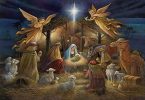All Saints’ Day (1st November)
Scriptures: Rev. 7:2-4, 9-14; Ps. 24:1-6; 1 Jn. 3:1-3; Mt. 5:1-12
The opening antiphon of the Eucharistic celebration says, “Let us all rejoice in the Lord, as we celebrate the feast day in honour of all the saints at whose festival the Angels rejoice and praise the Son of God.” According to this antiphon, we are participating today with all the saints and angels in the joy of the saints who have tasted the victory after their pilgrimage on earth. This feast also becomes the celebration of our faith. We profess in our Creed, “I believe in the Holy Spirit, the Holy Catholic Church, the communion of saints…” Today’s feast is an occasion of praising God with all those who have gone ahead of us. We experience true communion in Christ. This feast also becomes a celebration of our dignity. Pope Emeritus Benedict XVI said that the feast of All Saints Day is a celebration of the church’s dignity as the mother of saints. The church’s image of the eternal city is also highlighted. The church, the immaculate bride of Christ rejoices over her children who lived a life according to God. Thus, the feast throws a challenge to all of us to walk in the steps of the saints. St. Augustine accepts the challenge when he says if he and she can become a saint, why not I?
The liturgy today encourages us to accept the challenge. The first reading which is taken from the book of Revelation mentions a vision of St. John. It gives two visions. The first vision is given of the pilgrim people on earth. The four angels are told to wait before carrying out the destruction until the seal is put on the foreheads of the servants of God. They are spared because they lived the word of God in their lives. They were numbered 144,000 out of all the tribes of Israel. Then the second vision showed the huge crowd, impossible to count from every nation, race, tribe and language. They were standing in front of the throne and the Lamb. They were in white robes and holding palms, singing victory songs. The book was written in the midst of a hostile environment (persecution of Domitian in 96 AD?). The message of the vision was the victory of Christ has assured the victory of the faithful. We are called to sing the victory song even in the midst of persecution just like the early Christians who remained faithful to Christ in the times of persecution.
The same message echoes in the Gospel today. Jesus gives beatitudes. Mathew shows in his Gospel; Jesus gives these beatitudes on the mountain. He does it because he wants to show Jesus as the new Moses. Moses had given the ten commandments to the Israelites. The New Moses is now giving us a new law i.e. beatitudes. They are expressed in positive terms. They go beyond the Ten commandments. Mathew presents them in two parts. In the first part of each beatitude, it is the humiliation in the present time; in the second part, it is the glory of God yet to come. Actually, the evangelist portrays through beatitudes the life of Christ. Jesus lived the beatitude in the midst of persecution. He was glorified by the Father through His resurrection.
The beatitudes become the guide for holiness. Pope Francis chose this Gospel text while addressing us on the topic of the call to holiness. The scriptures say that those who follow the beatitudes are the blessed ones. The word which is used in Greek “makarios”. It was meant not only happy, fortunate or blessed but something more than that. It was referred to god in the ancient greek. They achieved happiness beyond all cares and worries of the earthly life. It also meant to the people who were dead. They too were beyond all cares and worries of the earthly life. At last, it was referred to the elite, upper and wealthy class. They were also beyond all cares and worries of the earthly life. In nutshell, the blessed one was living in a higher plane than the rest of people. The real translation of the word makarios would be “highly esteemed” or “truly honourable”.
The feast of All Saints invites us to be highly esteemed and truly honourable; standing before the throne of God and the lamb of God; in white robes and holding palms of victory; to be part of the huge and innumerable crowd. In other words, the feast is inviting us to live like Jesus, to shine in the light of Christ and to be God’s children. How to be like God’s children? Jesus says, “whoever serves me must follow me; and where I am, my servant also will be. My father will honour the one who serves me.” (Jn. 12:26) We are called to follow Christ’s teachings. It is summarized in today’s beatitudes. The saints lived beatitudes. If they can live the beatitude, why not we? The purpose of celebrating this feast does not add any praise to the saints. St. Bernard says, they do not need of our praises, nothing adds to their glory but when we think of them, we get inspired. Let us be inspired like St. Augustine and strive to be children of God that one day we may stand before the Lamb of God in a white robe, holding palms of victory on earthly life.






